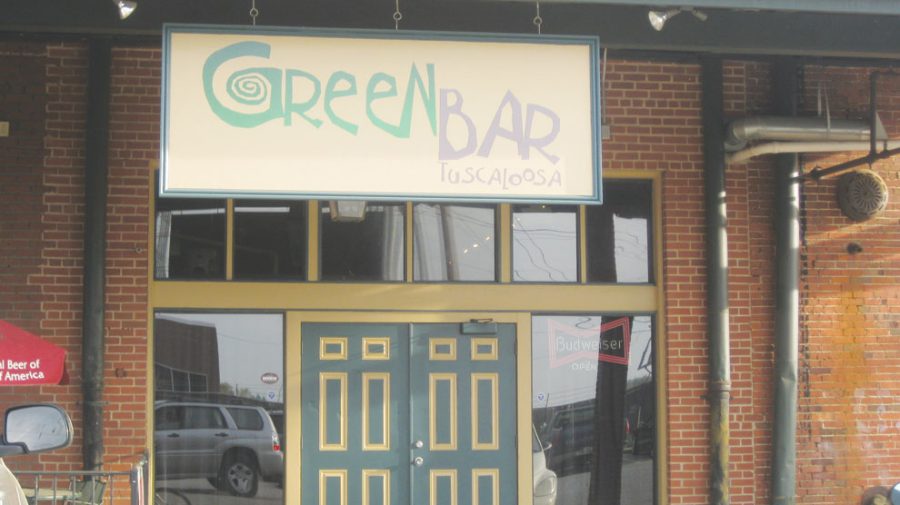Students and Tuscaloosa residents may have noticed that one of downtown’s well-known bars, Little Willie’s, has gone through a transformation.
In February, Little Willie’s reopened as Green Bar, a venue that is embarking on a new level of sustainability in Tuscaloosa. Owner Bill Lloyd has not only changed the bar’s musical focus from jazz and blues to alternative and indie rock, but he has also changed its impact on the environment.
“I really got tired of seeing all that brown glass going to the Dumpster,” Lloyd said. “I thought a venue of this size could do something about it.”
Green Bar sells beer in aluminum cans since Tuscaloosa does not provide recycling for brown glass bottles. An organization called Temporary Emergency Services recycles the cans and is able to keeps the proceeds for its charitable efforts.
“We’re trying to stay away from plastic whenever we can,” said Lloyd, holding up a stack of paper shot glasses. “We also have beverage napkins and hand towels that are made from 100-percent, non-bleached recycled material.”
Green Bar’s transformation reflects a growing, worldwide trend of sustainable business practices, and others in Tuscaloosa are beginning to catch on.
FIVE is a new restaurant and bar downtown that uses environmentally friendly to-go boxes made of 100-percent recycled paperboard. General manager Jeremy Hicks said the restaurant also cuts back on its use of Styrofoam whenever possible.
Hicks acknowledged that while the green product choices are more expensive, the restaurant is doing its part in looking out for both the environment and the community.
“I think some people are a little shallow-minded,” said Hicks in regard to green business innovations. “They don’t realize they need to make a change until there’s a real problem. In that way, I think [FIVE] is ahead of the game.”
Yet social responsibility may not be the only aim of green business innovations. Some restaurant and bar owners hope the changes will also have a positive effect on their marketing efforts by attracting a new generation of “earth-lovers.”
“I was going for a younger, hipper, more green-conscious clientele,” Lloyd said. So far, he admitted, it has been a good strategy to target the growing group of young people who are constantly aware of their impact on the environment.
“I thought they’d buy into it much easier and that they would be more receptive,” Lloyd said. “We made the change a couple weeks ago, and so far the reaction’s been very positive.”
Yet restaurants and bars are not the only businesses going green. The Tuscaloosa Amphitheater, which opened with its first performance on April 1, uses environmentally friendly soaps, tissues and microfiber hand towels. Weatherford Office Supply Co., off 20th Avenue between the Strip and downtown, supplies both Green Bar and the amphitheater with products from its green-certified line.
The company’s environmentally friendly product line includes a number of cleaners and paper products, as well as equipment such as green-certified vacuum cleaners. Owner Howard White said he began carrying green products about five years ago, before there was any local interest or demand.
“In this part of the country, people weren’t interested in green products at that time,” White said. “But we began educating ourselves and attending seminars. We knew that green products were the direction a lot of businesses would be headed soon.”









